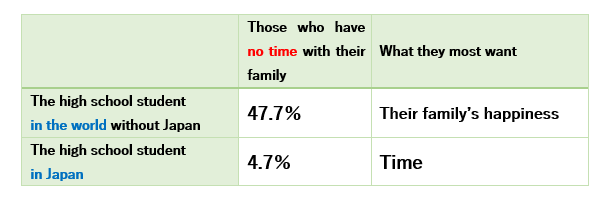What Makes You Happy? Please tell me your pleasure

- Our Happiness
The conclusion of the questionnaires
Contents
1Our happiness
2-1Actual conditions survey of happiness
2-2The results of the questionnaire for students in the world
2-3The results of the questionnaire for students in Japan
2-4The conclusion of the questionnaires
3-1Our Ranking of happiness
3-2The result of our ranking of happiness
We conducted a questionnaire both in English and in Japanese to think about what happiness is to high school students.
This is the observation.
(All tables are original)
The conclution of the questionnaires
We want to focus on the theory that negative emotions are one of the important things
for happiness which we introduced in "What is happiness?"
63 percent of the Japanese students answered that they regret about something,
but when you look at the answers to the question,
"Are you happy right now?" and compare answers of people who said they regret
about something and people who didn't, people with regret were much happier.

This applies to our theory we mentioned before,
"happy person is the person who knows that even though he or she
sometimes feels negative but is still satisfied with his or her life".
Of course, as the result of the questionnaire tells,
negative emotions are not always necessary but just an element to be happy.
Next, as for the question "What do you want the most right now?",
a lot of Japanese students answered time, money came second,
followed by academic achievements, and to the question "Are you happy as long as
you are wealthy?",
the percentage of the people who answered yes was about 60 percent,
which was larger than the percentage of foreign students by 16 percent who answered so.
On the other hand, a lot of foreign students said that they wanted their families to be happy,
and that they didn't have much time to spend with them.

We collected these data by making the most of our network we created through participating
in international studying programs, so among the students who cooperated,
there are quite a few people living apart from their families.
Thus, they miss the time with their families and wish for it.
In the same way, it can be assumed that Japanese students also wish for what is lacking
for them, that is to say, time.
To sum up, we all tend to wish for what is lacking or missing.

